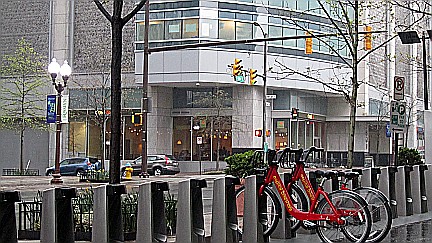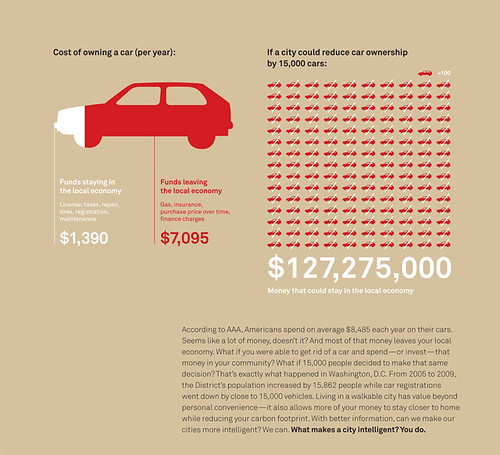Arlington County Republicans: penny wise but pound foolish when it comes to transportation policy, bikesharing

Image of a Capital Bikesharing station in Rosslyn from Arlington Now.
Washcycle reports, in "Arlington GOP opposes Capital Bikeshare," that the Arlington County Republican party has blogged against bikeshare in the County, in part as a competition with the private sector, but also because it uses street parking spaces.
The bikeshare system takes up 8 parkng spaces. To sound reasonable, the GOP blog entry discusses the loss of revenue from parking meters. Although the amount of revenue, $10,000 to $20,000, is minimal.
Plus, each of the stations will have at least 10 bikes, and likely support many more trips per day than a parking space would.
The funny thing about transportation policy in Arlington County is that they have amongst the nation's best transportation plan for a county-level jurisdiction. How I describe the plan is that it is internally consistent on two levels, the policies of each of the elements flow from the goals in the Goals and Policies Element, and each of the elements is internally consistent as well. From the Goals Element:
Goal 2: Move More People Without More Traffic
Provide more travel choices and reduce the relative proportion of single-occupant-vehicle (SOV) through Transportation Demand Management (TDM), telecommuting, and travel shifts to other modes including transit, carpooling, walking, and bicycling.
Strategies
1. Implement land use policies such as transit-oriented and mixed-use development that result in better access and use of the transportation system.
2. Focus on minimizing person delay across modes rather than focusing exclusively on minimizing vehicle delay.
3. Encourage the use of environmentally sustainable modes, including bicycling, walking, transit, carpooling, and telecommuting.
Arlington's Parking and Curbside Management Element of the Transportation Plan is set up to support the MTP's goal of reducing the number of single occupancy vehicle trips--that means the automobile isn't prioritized in transportation policy, but mobility throughput is.
When it comes to the use of streetspace, what that means is that Arlington prioritizes uses that support optimal mobility--not car storage on the streets. So streetspace priorities do focus to the extent possible--after all, even in Arlington people want their cars--on providing space for pedestrians (bulbouts, etc.), transit (bus stops), car sharing, and bicyclists. In fact, it is the #1 Policy in the Element:
Policy 1. Prioritize the use of curb space, matching the various types of uses to the most appropriate locations. In commercial areas and high‐density residential areas, generally consider bus stops, curb nubs, taxi stands, paratransit pickup, short‐term retail and handicapped parking to be the highest priority. (bold in the original, page 4)
I highly suggest reading the entire plan, including the element on parking and curbside management.
Just as Arlington's suit against the State of Virginia with regard to HOT Lanes was completely in line with the goals of Master Transportation Plan to not encourage automobile trips, Arlington's use of parking spaces for bikesharing is fully consistent with their transportation plan and their priority for land use in the Rosslyn-Ballston corridor.
Arlington should be commended, not criticized, for following their plan. Ironically, I have criticized DC's placement of bikesharing stations as more focused on taking away sidewalk area, at the expense of pedestrians, rather than cars. (Although because of how corner lots are situated in the L'Enfant Plan of the city, often this isn't a problem.) See "Bicycle sharing location decisionmaking in DC" from last fall.
A penny is a small amount of money and a pound is a larger amount. "Penny-wise, pound-foolish" is to be cautious (wise) with small amounts of money but wasteful (foolish) with larger amounts. Example: "We've worked so hard to save money that if we took a vacation now it would be penny-wise, pound-foolish." People sometimes worry about spending small amounts of money; then they carelessly spend much larger amounts. Example: "He spends very little on food during the week, then blows all his money drinking on the weekends. He really is penny-wise, pound-foolish."

Graphic, "The Space-Time-Money Continuum" by National Building Museum curator Susan Piedmont-Palladino, from the Intelligent Cities initiative. It's fair to say that when it comes to transportation policy and parking spaces, the Arlington County GOP is penny-wise, pound-foolish.
Labels: bikesharing, parking and curbside management, transportation planning, urban design/placemaking



0 Comments:
Post a Comment
<< Home